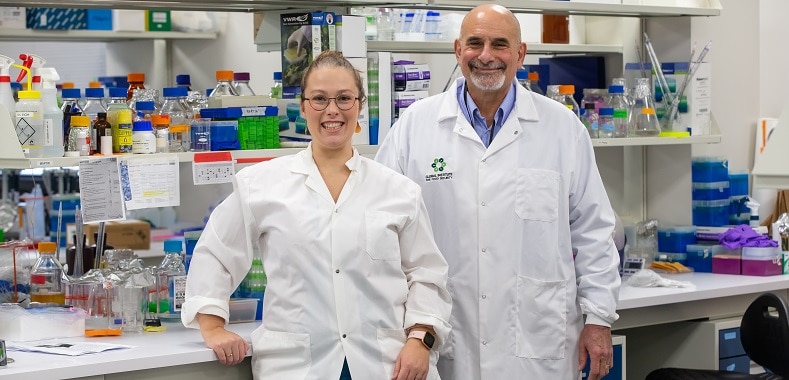2020
Global Institute for Food Security at USask awarded over $600,000 for project to help extend prairie growing season

Dr. Joanne Ernest (left) and Dr. Leon Kochian (right) in a GIFS lab (GetMyPhoto.ca)
A grant from Saskatchewan’s Agriculture Development Fund (ADF) is helping researchers at the Global Institute for Food Security (GIFS) at the University of Saskatchewan (USask) pursue a project that could help extend the growing season for canola and soybean in Saskatchewan and in temperate climates around the world.
The grant, which totals $604,000, was awarded to Dr. Leon Kochian (PhD), GIFS Associate Director and Canada Excellence Research Chair in Global Food Security at USask, and Dr. Joanne Ernest (PhD), GIFS post-doctoral fellow. Kochian and Ernest will combine their research expertise in roots, soil and plant reproductive biology in a project to develop seeds with improved tolerance to cold and other abiotic (physical) stresses, allowing for extended sowing onto cold May soils.
“Traditional breeding is not equipped to investigate below-ground traits such as fast or cold-tolerant germination and seedling root growth,” said Kochian.
“This project mobilizes GIFS’ unique capabilities to boost the economic potential of canola and soybean grown in Saskatchewan, improving early-season seed establishment and increasing yield stability for two crops of growing importance in the prairies.”
The collaborative project is just one more example of how the organization focuses on start-to-finish solutions to advance production agriculture.
“Our capabilities, expertise and partnerships put us in a unique position to be able to bring innovative solutions to market,” said Steve Webb, GIFS Chief Executive Officer. “This project is an excellent example of how we are working with Saskatchewan producers and farmers to address barriers specific to the prairie climate.”
Cold temperatures are one of the major abiotic stresses for crops in temperate regions and have been shown to deform plant parts and slow the growth of young seedlings, adversely affecting the final yield. The recommended minimum soil temperature for germination is 10 degrees Celsius, meaning there is a risk to early sowing in the cold months.
Early sowing of both canola and soybean will result in a number of benefits to producers, including optimal flowering and seeding filling stages during the moist summer period and reduced risk of frost damage in the fall.
“Producers are hesitant to sow seed in cold soil temperatures as this may impact germination, emergence and especially root establishment,” said Ernest.
“By identifying cold-tolerant varieties with reduced days to germination and threshold temperature at which germination can occur, we are helping reduce that risk for producers.”
Kochian received his Bachelor’s degree in Botany at the University of California Berkeley, United States in 1978 and his PhD in Plant Physiology at the University of California Davis in 1984. He joined the USask community in August 2016 as the Canada Excellence Research Chair in Global Food Security, as the Associate Director of the Global Institute for Food Security and as a professor in the plant science and soil science departments in the university’s College of Agriculture and Bioresources. His research deals with the molecular biology, physiology, and genetics of mineral ion transport and root biology processes as they relate to mineral nutrient acquisition, plant response to abiotic environmental stresses, and the role of root architecture in nutrient acquisition efficiency.
Ernest completed her Ph.D. in plant physiology and molecular biology at La Trobe University, Australia in 2016, and joined the GIFS team in Saskatoon, Canada, shortly after. Her research interests include plant cell biology, reproductive biology and proteomics. Her work at GIFS applies proteomics and other molecular techniques to understanding apomixis in Boechera.
The Agriculture Development Fund program is supported through the Canadian Agricultural Partnership, a five-year, $388 million investment in strategic initiatives for Saskatchewan agriculture by the federal and provincial governments.
To learn more about GIFS and the research of Kochian and Ernest, visit gifs.ca.
